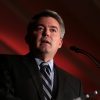Rep. Liz Cheney on Tuesday evening, a day before she was ousted from her No. 3 leadership position in the U.S. House Republican conference, gave a defiant speech on the House floor.
Cheney’s politics, like her hawkish foreign policy positions and anti-environment record, can be repellent. But she gets one big thing right: basic tenets of American democracy. She refused to fall in line with former President Donald Trump’s persistent lies about the 2020 election being stolen from him.
When she spoke Tuesday, every lawmaker cleared out of the chamber. Except one, Rep. Ken Buck of Colorado. And Buck was among the minority of House Republicans who voted against Cheney’s removal from leadership.
Much has been made of Buck’s supposed act of solidarity with Cheney. News stories have implied he’s that unusual Republican with the courage to reject the false claims that President Joe Biden’s election win was rigged. One Colorado editorial board went so far as to describe him as “doubling down on his refusal to insinuate that the 2020 election was rigged, stolen, fraudulent or otherwise taken from former President Donald Trump.”
This is ludicrous. Revisionism. Buck is no hero of democracy. He personally bears substantial blame for seeding doubt about the integrity of the election. And no one should forget it.
When last year he was both chair of the Colorado GOP and up for reelection to Congress, Buck asked the Justice Department and the Federal Election Commission to investigate postcards that contained instructions on how to register to vote and were sent by the Democratic secretary of state to Colorado residents. Previous Republican secretaries of state had also sent similar postcards. But Buck framed the get-out-the-vote campaign as an effort “to register individuals who are ineligible to vote” and based his allegations on a TV news story that had been retracted. He wasn’t after election integrity. Quite the opposite.
One of the most brazen attempts to overturn the results of the 2020 presidential election was Texas Attorney General Ken Paxton’s lawsuit that sought to delay certification of the vote in four battleground states that Biden won. Buck signed on to that lawsuit.
In his public statements for weeks after the election, Buck either avoided stating an opinion on whether the national election was fraudulent or suggested there was reason to doubt its integrity. What he did not say was that Americans could trust the results.
“I can’t speak for other states,” he said on Dec. 2 during a Zoom call on which he professed to trust only Colorado’s election. A week later he introduced a House resolution “supporting President Trump’s efforts to ensure that every legal vote is counted in the November 2020 Presidential election and to investigate and bring to justice those who perpetrate election fraud.” In January, Buck published an opinion piece in the Washington Post in which he wagged his finger at fellow Republicans who planned to block certification of Electoral College votes. But in the second paragraph he wrote, “I share the concerns of many voters across the country about irregularities in the presidential election.”
That piece appeared on Jan. 5. Those very same concerns inspired a mob of Trump supporters the next day to engage in insurrection at the U.S. Capitol.
We’re supposed to be impressed that Buck was the only lawmaker in the House chamber when Cheney declared her resolve on Tuesday? Maybe he’d merit some credit if support for an embattled colleague were his motivation. But what has not been widely reported is that Buck’s presence in the chamber was due to his role leading special order speeches that evening on the subject of cancel culture. He introduced Cheney as part of that role and had the responsibility to close out the session.
Buck lately seems to have adjusted his rhetoric about the 2020 election. “To suggest that the American people in 2022 won’t consider the fact that we were unwilling to stand up to a narrative that the election was stolen — I think (that) will be taken into consideration, with their vote,” the Post quoted him this week as saying.
But that’s not quite a statement of trust in the election. Even if it were, it does not erase his previous participation in election-denial. He is to blame for dangerous, unforgivable behavior that contributed to the false belief among millions of Americans that the election was illegitimate and helped fuel the sinister political forces that are cutting down anyone, like Cheney, who dares to speak the truth.
Coloradans must never forget Buck’s role in this dark chapter of American history.
This op-ed was originally published by Colorado Newsline.



